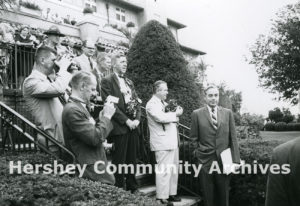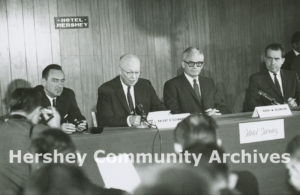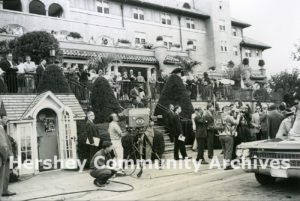Seeking the Highest Office: Governor Scranton and the 1964 Presidential Race

Few people know that Hershey played a part in the 1964 GOP presidential campaign. Before we get to Hershey, let me give you some background.
The Republican primaries of 1964 featured liberal Nelson Rockefeller of New York and conservative Barry Goldwater of Arizona as the two leading candidates. Shortly before the GOP convention, Rockefeller saw his popularity wane in the wake of negative publicity surrounding his divorce and remarriage.
Concerned about selecting a very conservative presidential candidate, moderate Republicans moved into action as it appeared more and more likely that the conservative Goldwater was headed for a first ballot victory at the GOP Convention. On June 6, Pennsylvania State Senator Hugh Scott started a movement to draft Pennsylvania Governor Scranton to be on the ballot, hoping that Scranton could pull together all the liberal and moderate Republicans to defeat Goldwater.
The following day, Governor Scranton stopped to visit former President Eisenhower while on his way to the National Governors’ Conference in Cleveland, Ohio. Eisenhower encouraged Scranton to officially enter the race. Scranton finally joined the race on June 12, 1964. Rockefeller dropped out on June 15 and endorsed Scranton.
Scranton made a swing throughout the nation to speak with as many delegates as possible. Scranton gradually worked the moderate delegates who preferred Goldwater to Rockefeller and won endorsements in Ohio and Maryland.
Bill Scranton’s efforts were too late.
In 1964 Barry Goldwater decisively won the Republican Presidential nomination on the second ballot. In his acceptance speech, Goldwater set forth the “cause of Republicanism.” His most famous passage was:
Today… the task of preserving and enlarging freedom at home and of safeguarding it from the forces of tyranny abroad is great enough to challenge all our resources and to re-fire all our strength. Anyone who wants to join us in all sincerity, we welcome. Those who do not care for our cause, we don’t expect to enter our ranks in any case. And let our Republicanism, so focused and so dedicated, not be made fuzzy and futile by un-thinking and stupid labels. I would remind you that extremism in the defense of liberty is no vice. And let me remind you also that moderation in the pursuit of justice is no virtue.
Many GOP moderates were offended by Goldwater’s words. His speech was seen as a deliberate insult to their more tempered values. Letters of protest poured into the GOP National Committee, and Goldwater could see that his cold, unconciliatory acceptance speech and his explosive line about extremism had refueled, rather than dampened, fiery convention tempers. He knew that something had to be done about it.
Then, carrying out a plan conceived even before the convention, Goldwater skillfully handled a remarkable summit conference of GOP leaders in Hershey, PA held at Hotel Hershey on August 12, 1964.
Moderated by former President Dwight Eisenhower, the GOP summit brought together many of the party’s leaders, including Pennsylvania Governor William Scranton, Richard Nixon and Vice-president GOP candidate William Miller.
The Summit made no significant impact on Mr. Goldwater’s presidential campaign. In the November election, he would win only his own state, Arizona and the five states of the deep south. Lyndon Johnson would sweep the election with 61 percent of the popular vote and four-fifths of the electoral college votes.

